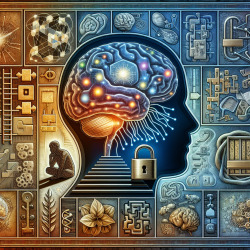Introduction
As practitioners dedicated to improving outcomes for children, understanding the nuances of cognitive development is crucial. Recent research, such as the study "Toward a Neuroscience of Adult Cognitive Developmental Theory," provides valuable insights into how adult cognitive development can be understood and applied in therapeutic settings.
The Framework of Kegan's Constructive Developmental Theory (CDT)
Kegan's Constructive Developmental Theory (CDT) offers a framework to understand how adults construct their reality through evolving thought processes. This theory suggests that cognitive development continues into adulthood, characterized by increasing awareness of one's emotions and beliefs. Practitioners can leverage this understanding to tailor interventions that promote higher stages of cognitive development.
Neuroscience Insights: Self-related Processing and Theory of Mind
Neuroscience plays a pivotal role in understanding adult cognitive development. Two key concepts, self-related processing and theory of mind, are essential for practitioners. Self-related processing involves distinguishing between having conscious experiences and being aware of those experiences. Theory of mind extends this awareness to understanding that others have different mental states. These concepts are linked to specific brain regions, such as the medial prefrontal cortex and temporal lobe, which are crucial for social processing tasks.
Implications for Disorders
Understanding adult cognitive development has significant implications for addressing disorders like autism and depression. Deficiencies in cognitive development can contribute to these conditions. By exploring the neural mechanisms underlying these processes, practitioners can develop targeted interventions. For instance, enhancing self-related processing may alleviate depressive symptoms, while improving theory of mind can aid in autism treatment.
Encouraging Further Research
While current research provides a foundation, there is a need for further exploration of adult cognitive development. Practitioners are encouraged to engage with ongoing studies and contribute to the growing body of knowledge. By doing so, they can refine therapeutic strategies and enhance outcomes for individuals with developmental disorders.
Conclusion
Integrating insights from neuroscience and cognitive developmental theories can transform therapeutic practices. By understanding the complexities of adult cognitive development, practitioners can create more effective interventions. For those interested in delving deeper into this topic, the original research paper offers a comprehensive exploration of these concepts.
To read the original research paper, please follow this link: Toward a Neuroscience of Adult Cognitive Developmental Theory.










